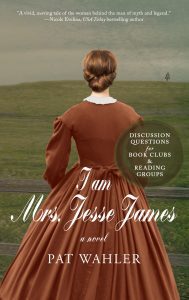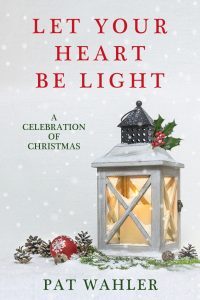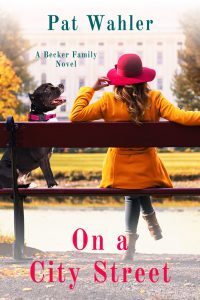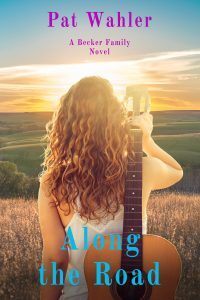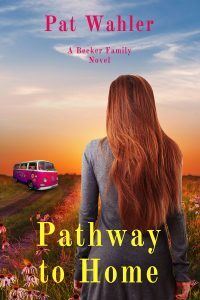Jeanne Felfe's Blog
August 9, 2023
Say Yes to Human-Written Words Always
Welcome to the middle of July (almost). I live smack dab in the middle of the US and it’s been overly hot. The last few days, there’s been a reprieve, so I find myself in my favorite place as I write this—my deck. I haven’t written by the pool—my other favorite spot—this season. The remodel changed the dynamic and my table is now on the opposite side. It feels “off” so I’ll have to ease into it. Plus, I’m also trying to spend less time on my computer and more time relaxing to give my body time to heal from my autoimmune disease.
Recently, news of AI-generated “books” on Amazon hit the news. You may see them in the best-seller charts on Amazon, or they may pop up on your Kindle as suggestions for your reading. The problem? These aren’t books written by human authors like me. These books are “written”—and I use the term books and written loosely—by AI bots who developed their writing chops by absorbing the content in real authors’ books—without their permission and without compensation—and then regurgitating the mish-mashed results and selling them to people expecting original stories. Some may have been generated by real people hoping to game the system and get a jump on the market by creating “books” fast. A quality read may not be their end-game, so reader beware.
I don’t know about you, but I enjoy reading books written by human authors and have developed a long list of authors I absolutely love. I strive to support them by buying their books, reading them, and then reviewing them. I also love finding new authors and supporting them. Why? One, because I know I will enjoy reading them. Two, writing a book is hard work, requiring hundreds of hours of creative thinking, writing, editing, etc., and authors deserve to be paid for their time. Readers can purchase an ebook for less than a cup of coffee, and few authors actually make a living wage writing them. Yes, it’s true. Supporting authors allows them to continue to create books you love, books they write themselves.
Everything you read from me, I wrote. Myself. No AI involved. Why? Because I’m a writer and writer’s write. That’s my rant today as I struggle (and love) creating stories for humans by a human.
April 1, 2022
Interview with Author Pat Wahler
I have the great fortune of living in an area with many wonderful writers. I knew Pat Wahler long before reading I am Mrs. Jesse James. We both belong to Saturday Writers in St. Peters, Missouri, an absolutely phenomenal organization for writers of all levels. If you read Chicken Soup for the Soul anthologies, you’ve probably encountered her work since she’s a frequent contributor. I thought it would be fun to interview her so my readers might discover a new “must read” author.
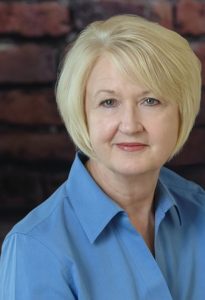 Pat Wahler is the author of Western Fictioneers’ Best First Novel of 2018 and Walter Williams Award winner, I am Mrs. Jesse James; along with a three-book contemporary romance series and a Christmas collection of short stories. A frequent contributor to the Chicken Soup for the Soul anthologies and Sasee Magazine, her work has also appeared in Reader’s Digest, Storyteller Magazine, and other regional and national publications.
Pat Wahler is the author of Western Fictioneers’ Best First Novel of 2018 and Walter Williams Award winner, I am Mrs. Jesse James; along with a three-book contemporary romance series and a Christmas collection of short stories. A frequent contributor to the Chicken Soup for the Soul anthologies and Sasee Magazine, her work has also appeared in Reader’s Digest, Storyteller Magazine, and other regional and national publications.
Pat is an avid reader with a special passion for historical fiction, women’s fiction, and stories with heart. She lives in Missouri with her husband, a Peek-a-poo pup named Winston, and Bogey, a tabby with attitude. A fan of good books, history, humor, animals, and the arts, Pat draws inspiration from family, friends, and the critters who relentlessly supervise every moment she spends at the keyboard.
Welcome, Pat. Tell me about a book that made you cry. Why?
Any time a story includes a dog, you can bet at some point I’ll be bawling like a baby. It takes much more to wring tears out of me related to human characters, but a certain novel did the job well. Early in 2021, I read A Fall of Marigolds by Susan Meissner. A dual timeline, the book is set in two different periods: September 1911 and September 2011. The earliest timeline features a woman dealing with the tragic Triangle Shirtwaist Factory fire, while the more modern setting shows the struggles of a woman who still hasn’t come to grips with the loss of her husband ten years earlier during the terrorist attacks of September 11, 2001. The two narratives are related, and the reader discovers how as two women separated by time attempt to work their way through crippling grief.
I think my own emotional state regarding the events of September 11 helped to fuel my reaction, but I hasten to add the novel isn’t at all a depressing tale. Rather, it uplifts the reader, showing us there is a path from even the darkest night. I highly recommend it!
As a fellow dog lover, I completely understand about the bawling. I haven’t read A Fall of Marigolds yet, but am adding to my TBR.
How do you write? Typewriters, fountain pen, dictate, computer or longhand?
My first step in storytelling is research and tons of note-taking, done the old-fashioned way—with pen and paper. In the same fashion, I prepare character sketches and fiddle with structure, as I try to decide in what direction the story will go. As ideas occur to me, I jot them down. I like the practice of starting the writing process in longhand since it uses a different part of the brain than typing. In my mind, this helps with creativity. Ideas flow more freely.
Once I have a decent grasp of the basics, I sit at the keyboard and type. That said, as a manuscript evolves, my plan can change. Nothing is set in concrete, and I’m always open to modifying the original plan if it serves the story.
We’re the exact opposite since I’m a discovery writer and research when I need it, but since you write a lot of historical fiction, pre-research seems like a must.
Do your novels carry a message?
Even though I don’t set out to deliberately convey a message to readers, some sort of theme typically emerges over the course of writing. For I am Mrs. Jesse James, Zee finds redemption, even though she’s married the most infamous outlaw of the Old West. Each of the Becker Family Novels has a character arc as well, whether it’s learning to trust again after a betrayal, pursuing a dream against all odds, or healing from the pain of grief.
Come to think of it, I suppose most stories have a theme. It’s why we read—to learn about ourselves through the lens of a fictional character.
I suppose they do indeed. Of course, for me, it usually takes an astute reader to point it out. Ha!
Who are your favorite authors? Have they influenced your style?
My favorite genre to read (and write) is historical fiction. My favorite authors are those who write compelling and well-researched immersive stories that seamlessly transport me into the past. A few authors at the top of my list are Susanna Kearsley, Kate Quinn, Marie Benedict, Melanie Benjamin, Stephanie Dray, Fiona Davis, Kathleen Grissom, Paula McLain, and Susan Meissner. There are others as well.
I loved Paula McLain’s When the Stars Go Dark.
I think a writer can’t help but be influenced by what they read, which is why it’s important to be familiar with the work of authors who are masters. Those who are at the top of their game. Reading a beautiful turn of phrase or unique style makes me eager to work harder on improving my own manuscripts.
What is the most special thing a reader has said about one of your books?
I chose to answer this question as it relates to my debut novel, which also happens to be my best-selling book, and the one that’s been honored with multiple awards. I am Mrs. Jesse James is the story of the woman who married a notorious outlaw. I worried about tackling this subject, as the James family continues to be of great interest to the public. Speculation, differences of opinion, and outright misinformation abounds. Would there be backlash over the way I portrayed Zee, or the way I pictured Jesse?
To my great relief, general reader feedback was gratifying. But how would those who studied the James family react to the book?
I got my answer when a bookstore owner located in northern Missouri where Jesse is alleged to have robbed a bank contacted me. She had read the book and reached out to let me know how much she loved the story because she felt I had treated Jesse’s wife with respect.
She couldn’t have said anything to make me happier.
I agree that was a tough topic to tackle, and you did it in such a way as to bring the characters alive.
What are you working on now?
I recently finished my second historical novel, which is currently out to several publishers on spec. I’m super excited about this biographical tale of another person from Missouri’s history, a multi-talented woman I found to be smart, funny, inspiring, and totally fascinating. I can’t wait to share her story!
While decisions are made on how the book will be released into the world, I’m currently writing my first dual timeline story. My work-in-progress is set during the Christmas season and is loosely based on events in my grandmother’s life. Stay tuned. It’s scheduled to be available to readers by Fall 2022.
I can’t wait to find out who this mysterious character is.
This has been fun. Thanks so much for hosting me, Jeanne!
Thank you for taking a break from writing to share with my readers.
Here are links to Pat’s books (click the pictures):
Contemporary Romance
To connect with Pat: — Website — Facebook Author Page — Goodreads Author Page — Instagram — Twitter — Amazon Author Page — Bookbub Author Page — Pinterest
May 20, 2021
Why We Write
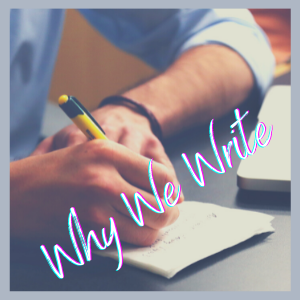 Aspiring writers are often told they should write for the sheer joy of it. I suppose the well-meaning person saying such a thing might do so because publishing is a hard business and not everyone is going to make it big. Perhaps this person is trying to spare the feelings of someone recently rejected. I don’t know for sure, but any time the word “should” prefaces a suggestion I question it. I’ve tried to eliminate as many shoulds from my life as possible. I “should” exercise three times a week—but what if my body needs five times, or does better with once? I “should” eat fewer carbs—perhaps, but what if an ultra-low-carb diet brings on depression or exhaustion? I “should” write every day—but what if my brain produces large chunks of words that get dumped out onto the page all at once and then requires days to recuperate? I “should” … well you get the idea.
Aspiring writers are often told they should write for the sheer joy of it. I suppose the well-meaning person saying such a thing might do so because publishing is a hard business and not everyone is going to make it big. Perhaps this person is trying to spare the feelings of someone recently rejected. I don’t know for sure, but any time the word “should” prefaces a suggestion I question it. I’ve tried to eliminate as many shoulds from my life as possible. I “should” exercise three times a week—but what if my body needs five times, or does better with once? I “should” eat fewer carbs—perhaps, but what if an ultra-low-carb diet brings on depression or exhaustion? I “should” write every day—but what if my brain produces large chunks of words that get dumped out onto the page all at once and then requires days to recuperate? I “should” … well you get the idea.
All of this “shoulding” on ourselves can be exhausting if not frustrating. What one should do instead—oops, I just did it myself. Find what works for you. And do that. It may take multiple attempts to figure it out.
So, why do we write? I can only answer that question for myself. There’s something about creating story that brings aliveness to my being. But while I would probably still write just for the joy of it, even if there was no hope of ever selling anything, for me writing is a business and I approach it as such. I have an LLC for my publishing business. I take it seriously. But I don’t write every day. Since I have now published one novel and one multi-author anthology, I also spend time marketing. I’m trying to learn to enjoy this aspect of the business because as any published author—traditionally or Indie—will tell you, marketing is a necessary activity if you want to sell what you’ve written.
However, the business path is not the only one available to writers. There are as many paths as there are people who pick up a pen. Many write because the hobby brings them pleasure. They have no other goal in mind and there’s absolutely nothing wrong with that. Perhaps your path is to capture the stories of your life to share with your family so they understand where they came from. Maybe it’s more important to have the stories than it is to have fame and fortune. Or perhaps that’s where you began and now realize you want to take it further and create a book of these stories, or a book-length memoir. What way is yours, go for it.
The bottom line is that there are no “shoulds” you must apply to whatever writing path you choose. There’s nothing to be ashamed of if you write in the hopes of someday selling your work. I write commercial fiction and am proud of that fact. And just because you start down one path doesn’t mean you can’t hit the clutch and reverse course in another direction. Find your own WHY and write.
March 26, 2021
Heaven and Hell
 Most religions have a belief structure surrounding the afterlife. Raised Southern Baptist, my early beliefs of Heaven and Hell, were about where the good and bad people respectively, go after death. When I became an adult and ventured out into the world, I discovered that although the concepts of Heaven and Hell were common, the how of entry varied—in other words, what it took to get into one or the other. I began to explore beyond religious constructs and found I had questions. Lot of questions. A big one was, if the how of entry could be different, then perhaps the whole concept itself could also be called into question. Thus began even more examination, a journey I expect to continue on my entire life.
Most religions have a belief structure surrounding the afterlife. Raised Southern Baptist, my early beliefs of Heaven and Hell, were about where the good and bad people respectively, go after death. When I became an adult and ventured out into the world, I discovered that although the concepts of Heaven and Hell were common, the how of entry varied—in other words, what it took to get into one or the other. I began to explore beyond religious constructs and found I had questions. Lot of questions. A big one was, if the how of entry could be different, then perhaps the whole concept itself could also be called into question. Thus began even more examination, a journey I expect to continue on my entire life.
What if Heaven and Hell are really about this life, while still living, and not some place in the sky (Heaven) or in fire under the ground (Hell)? I’m sure you’ve all known someone whose life is a living hell… perhaps it’s you? And we all know someone who seems to have been triply blessed regardless of religious affiliation.
What if when we die, we all become beings of Light, given an opportunity to review our lives and learn from what we did right and what we could have done better? That there is no punishment, only love?
I’ve learned that many people share my consideration, even some who are deeply religious. I would like to open a dialogue on these “what ifs?” but please do a deeper dive and not just a knee-jerk reaction based on what you believe. All opinions are welcome, but if you’ve come here to argue that your way is the only way, you’re in the wrong place.
Interview with Author Shirley Anderson
[image error]Today I have with us, Shirley Anderson, a newly published former nun who is an absolute delight. Shirley has lived quite the adventurous life, and shared some of wonderful stories in her memoir, Poverty, Virginity & Love.
Jeanne: Shirley, tell us about yourself
Shirley: I tried to think of a fun fact or something quirky the reader might not know about me. The best I could come up with was I do not like fishing, an experience I have had twice in my life.
The first was after I left the convent and was dating a divorced business professor who took me fishing in his “sturdy” jon boat with two bench seats. I am not sure if it was aluminum or wood, but it was not sturdy. A short way from the Florida shore, the boat overturned, and now we were swimming. We didn’t take time to blame the waves, one another, or the devil.
“Can you touch bottom?” I said frantically.
“Yes, it is shallow,” he said. “You can walk to shore.”
Wet and struggling, we pulled the boat and didn’t even consider trying to regain his fishing gear.
I did continue to date him, but never fished again in Florida.
My second experience with fishing was on a family vacation to Rend Lake in Illinois. Two grandsons were with us and the oldest, Brennan, caught his first fish. When he saw blood near the mouth of the cold-blooded tiny creature, he said, “Grandpa, please help him, he’s hurt.”
Grandpa removed the hook, returned the green-banded bass to the water, and we watched as the tiny creature swam home. Brennan’s sad face returned to a smile as I gave my compassionate grandson a hug.
Jeanne: What a sweet story. Out of the mouth of babes.
Jeanne: Tell us about your new book
[image error]Shirley: I started Poverty, Virginity & Love as a vignette of cities I had visited. When my husband died in December of 2018, the book evolved into a memoir that begins with me entering the convent, and recounts a life far more adventurous than expected. I had considered going to Africa and being a martyr, and dying for Jesus; instead I was gifted with a life lived six years in Pusan (Busan), Korea.
The first title was Six on a Honda, but some thought it might be confused with Sex on a Honda, and a family member rejected it because, “Title doesn’t describe the content of chapters.” I had only a few chapters drafted at that time. As for titles, there were thirty suggested before I decided on this one. Those with “Grandma” and “Nun” were discarded. I selected the present title because as I nun I had taken the vows of Poverty, Chastity, and Obedience, and the current title also describes me after leaving the convent.
The next foreign experience was in war-torn Vietnam, comforting my parents with “Not everyone returns in a body bag.” The tour of China with the family, especially the ten-year old grandson was memorable. Consulting in the State of Kuwait was a professional highlight. I learned from cultures dangerous, historically ancient, entertaining, and exciting throughout the world, and trust the reader will also find this to be an enriching experience.
Jeanne: What kinds of jobs have you had in the past? Does it play any role in your stories?
Shirley: In 1997, I retired from Saint Louis University as Professor Emeritus after twenty plus years of tenure in the Medical Record Administration Department, which subsequently changed to Department of Health Information Management, in keeping with the advancements in computerization of medical information.
My memoir includes my medical records career, staring with an assignment by the Mother General of Maryknoll to study this field for nine-months at Saint Joseph’s Hospital in Lowell, Massachusetts for accreditation. After that, medical records was part of my life until retirement.
Writing articles for professional publications was needed to advance from Assistant Professor to Associate, and then Professor. I did not consider books until I was selected by Delmar Publishers to be a Series Editor. This entailed contacting my colleagues to have them publish their books with Delmar. I co-authored a book during this time. I learned that books required for courses sell better than generic books about the profession.
Jeanne: Name a book that made you cry. Why?
Shirley: I did not shed actual tears, but other than the Bible, the story that has added meaning to my life choices is the play/novel (1960), movie (1966), and TV movie (1988) A Man for all Seasons, thanks to Robert Bolt, the playwright. My favorite scene in the 1966 movie, which is recorded on my TV, is when Margaret, Thomas More’s daughter, is engaged in Latin repartee with King Henry VIII. Orson Wells is Cardinal Wolsey in the movie version and Charlton Heston replaces Paul Scofield as Henry in the 1988 TV movie. For me, Thomas, who was a scholar and the most brilliant lawyer in England, followed his conscience even though it meant being beheaded and his family suffering from his decision.
Jeanne: How long have you been writing?
Shirley: From the time I entered the convent in 1953, a weekly letter home included such requests as “Please send me a card of hair pins. Some of the other postulants set their hair so I guess I can too.” I wrote to my family and friends during my Novitiate in Valley Park, Missouri. My father typed weekly letters to me, and I responded until the early 70s, when I was settled in the States.
During my six years (1961 to 1967) in Pusan (Busan), South Korea, I prepared letters informing benefactors in the States about activities, requested donations for the children and the hospital, and thanked them for past contributions.
The nine page article “Vietnam Report: A Medical Record Librarian in Saigon,” June 1970 issue was my first professional publication. An article based on my Thesis was published in 1973. For over twenty years, the typical college professor’s activities: consulting, publications, presentations, community service, teaching assignments, grants, and honors were included on my curriculum vitae. In 1991, I began as Series Editor in Health Information Management for Delmar Publishers, which continued until 1997, when I retired as Professor Emeritus from Saint Louis University.
Jeanne: It sounds like writing has always been a part of your life.
Shirley: From the time of retirement until the present, I tried to write a novel. When my husband died in 2018, I changed to a memoir and thanks to Jeanne Felfe, I have a publication.
Jeanne: Your project has definitely been one of the more interesting ones I’ve worked on.
Jeanne: How do you write? Typewriters, fountain pen, dictate, computer or longhand?
Shirley: I wrote this memoir on my computer in an office with three windows facing the street. I use longhand when I need to copy from the Internet or other places.
Jeanne: Do you have a lucky something?
Shirley: I try to avoid 13 for important events, although my niece Susan Marie, considers 13 her lucky number. I try to avoid eating around my computer most times. When my husband was alive, we would use folding tables for light meals as we watched one of the grandsons play ice hockey streaming on the computer screen.
Jeanne: What are you currently reading?
Shirley: With a published book, I now have time to start reading my editor’s book, Bridge to Us, which is hard to put down, at a time when marketing is a top priority for me.
Jeanne: Aww…thank you for saying that.
Shirley: I have a goal of fifteen minutes of spiritual reading daily. Most recently this has been Welcome, There is More to Life, a publication of The Dynamic Catholic Institute and Beacon Publishing. Welcome is more than a book, it is an experience with meetings, now on Zoom, and a preparation for conducting a retreat for women of the parish. Men have this study to conduct a retreat for men.
During the formation process a few of the subjects are “God’s Dream for you,” “Prayer,” and “Do You Trust God?”
Jeanne: Do you have a favorite quote?
Shirley: In February of 1961, I began writing in my black book, quotes from spiritual reading. Some have titles only. One from “Reader’s Digest” is humorous and may not be a direct quote, but this is how I jotted it down:
“An old Englishman I met in Africa was reminiscing about his explorations in earlier days, and the shock of one culture meeting another the first time.”
“Can you imagine,” he said ‘people so primitive that they love to eat the embryo of certain birds, and slices from the belly of certain animals? And grind up grass seed, make it into a paste and burn it over a fire, then smear it with a greasy mess they extract from the mammary fluid of animals?’”
“While I shuddered at such barbarianism he went on. ‘What I’ve been describing, of course, is a breakfast of bacon and eggs with buttered toast.’”
Jeanne: That’s hilarious!
Shirley: In the 60s I read Springs of Oriental Wisdom by Fu-Kiang. These are a few of the quotations:
Confucius says: “Man has three ways of acting wisely: Firstly on meditation, this the noblest; secondly, on imitation, this is the easiest; and thirdly, on experience: this is the bitterest.”
“He who is really kind can never be unhappy; He who is really wise can never be confused; He is really brave is never afraid.”
Lao-Tse says: “Kindness in words creates confidence; Kindness in thinking creates profoundness; Kindness in giving creates LOVE.”
I have several from A Man for All Seasons, among them these two:
“And when we stand before God, and you are sent to Paradise for doing according to your conscience, and I am damned for not doing according to mine, will you come with me, for fellowship?” (Thomas More)
Margaret to her father: “But in reason! Haven’t you done as much as God can reasonably want?”
More’s response, “Well…finally…it isn’t a matter of reason; finally it’s a matter of love.”
Jeanne: those are some awesome quotes.
Jeanne: What’s Next? What are you working on now?
Shirley: I have Squeeze, a children’s story with a piano accordion as the main character. It needs more work, illustrations, and I would like to include an accordion sing-a-long on a CD. I may return to it after marketing my current book.
Jeanne: That sounds cute.
Shirley: Also I could work on Eating to Be Healthy and Happy, originally The Hail Mary Diet, about slow eating.
Jeanne: something I’m sure we could all use.
Jeanne: Do you read your book reviews? How do you deal with bad ones?
Shirley: I am looking forward to positive, constructive reviews and will definitely keep these. When I was a professor and teacher, I kept all the positive comments from my students. Incidentally, there are no negative ones in my file. I am not sure how I would deal with bad book reviews as I am sensitive. Time will tell.
Links to Shirley:
Shirley, thank you for spending time with us. Be sure to check out Shirley’s newly published memoir, Poverty, Virginity & Love.[image error]
Interview with Author Diane M. How
[image error]One of my long-time critique partners and friends, Diane M. How, has been on a roll, creating the zany sister trio of characters in her The Dahlonega Sisters series. Her newest, Veins of Gold, came out recently and I was able to capture a bit of time from her between projects for this fun interview.
Jeanne: Diane, tell my readers a bit about yourself.
Diane: I’m a sexagenarian! Ooh, that sounds a little dirty. Let me try again. I’m a hopelessly optimistic author who loves life and couldn’t make it through a day without humor. I’ve earned every laugh line, gray hair, and muffin roll that comes with the golden age.
Besides writing, I love walking with my very chatty husband of forty-nine years. He’s got a keen eye for wildlife, birds, and gardening and still entertains and amazes me with his extensive knowledge. However, upon questioning some of his facts, he admitted that when he doesn’t know an answer, he just makes it up. I often warn friends to use the fifty-fifty rule when he shares information.
My daughter and I have been weaving baskets for more than twenty years and if I didn’t gift them to friends and family, we’d need another room to store all of them. I’m still at the advanced beginner level, but my daughter has mastered the craft and teaches others how to weave. Believe it or not, there are others who want to learn this ancient art!
Most of my days are spent sitting in front of the computer, but there was a time when I rappelled a hundred-foot cliff, rode a submarine to the bottom of the ocean, and zip-lined though Meramec State Park. Now I let my characters take me on adventures. Guess in some ways I’m living vicariously through them.
Jeanne: I’ve seen some of your so-called “advanced beginner” baskets and they are amazing.
Jeanne: How long have you been writing seriously?
Diane: Writing has always been my emotional release when stressed or sad. When I was a young teenage, my two-and-a-half-year-old brother died from cancer after a year of horrific treatments. Our family never discussed the permanent wounds inflicted with his death. The only outlet I had was writing and I destroyed everything I wrote for fear of someone else reading it.
Later, as a young mother, I wrote stories about my daughter and her favorite stuffed dogs. For the life of me I can’t find any of them but it was an enjoyable effort.
I lacked the knowledge, time, and courage to do anything with my scribbles. I dabbled in poetry and writing vignettes while working full time and caring for my mother who had Alzheimer’s. When I could squeeze it in, I took courses at the community college or through adult education programs.
Ten years ago, after multiple family deaths, a forced retirement, and nearly losing my husband to a heart attack, I again turned to writing as a release. I filled notebooks with tear-stained pages of pent up emotions. When the dust settled, I was lost.
[image error]After years of never having a moment to myself, I struggled with what to do with free time. The local library had a writing critique group and I decided to attend one of the meetings. Best decision ever. With the help of others, I began to refresh my skills and improve my writing. A fellow writing friend offered to help me publish some short stories into a book, Peaks and Valleys.
Then someone encouraged me to participate in NANOWIMO (National Novel Writing Month – November) and I jumped in with both feet. With no plot and only two characters I’d created while taking a class, I sat down and wrote a 50,500 word romantic suspense novel. As with many first attempts at novel writing, it’s been rewritten many time and currently is collecting dust in cyberspace, but I’m prepared to scrub it up very soon.
Jeanne: Do your novels/stories carry a message?
Diane: I’m always looking for the silver lining, hence my blog https://authordianemhow.com. My stories always have a happy ending. There is enough grief and anger in this world without me creating more.
I also believe there are always two sides to a story and it is important to keep an open mind until you know both. So often quick decisions are made, hurtful words are spewed, and relationships are severed before the entire truth of a situation is known. I try to subtly incorporate that belief into my stories hoping readers leave with a little more tolerance, patience, and understanding.
Jeanne: Who are your favorite authors?
Diane: I enjoy Debbie McComber, Susan Mallery, and Jodi Picoult because they write stories that tug at my heart.
Jeanne: Have they influenced your style?
Diane: Each of them has opened my mind to the type of books I want to write. Debbie’s novels showed me how I could build a series around my characters. Susan showed me how humor can be incorporated effectively. Jodi inspires me to write about sensitive subjects that enlighten readers. I admire all of them.
[image error]My first published novel is a women’s fiction, The Dahlonega Sisters, The Gold Miner Ring. It’s the first in a series designed around three fictional middle-age women who live in Dahlonega, Georgia. I’ve been to this quaint historic town many times and knew it would be the perfect location for my sisters to live.
Quirky, eccentric Mutzi steals the main role. She’s witty, superstitious, and loveable. She’s forced to reveal a teenage transgression that’s burdened her all her life.
Jeanne: And the story continues?
[image error]The second book of the series, The Dahlonega Sisters, Veins of Gold, was released in November 2020. Although it continues where the first story left off, it was written as a stand-alone. In this book, Mutzi’s twin sister, Marge—who looks and acts nothing like Mutzi—takes the lead when she is told a secret that could change their family dynamics. In order to prove or disprove what she’s been told, Marge must do ancestry research. Will the results disprove her fears or will they change the dynamics of The Dahlonega Sisters forever? You’ll have to read Veins of Gold to find out.
You can find it at your favorite retailer at: https://books2read.com/u/mvnnLJ
They make a great holiday gifts for friends and family too!
I happen to know that Diane is a prolific writer with stories and poems scattered across multiple anthologies. You can check out her work and follow Diane at these links:
Diane, thank you for spending time with us. Be sure to check out Diane’s current works.
Interview with Author Ken Lee
[image error]I recently had the delightful pleasure of editing, formatting, and assisting with the publication of a wonderful book of Biblically-inspired plays by Ken Lee called Voices from the Bible. I decided in the spirit of Thanksgiving to share this with my readers by interviewing Ken. (Note, since originally publishing this in November 2020, I’ve worked with Ken on the 2nd in the Voices series, Christmas Plays.)
Ken did something amazing with these plays. He made stories from the Bible accessible … to anyone regardless of religious persuasion.
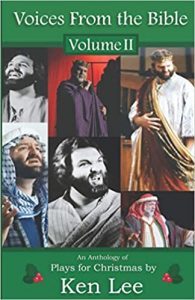 Jeanne: Tell us about your life and how it relates to you most recently released book Voices from the Bible.
Jeanne: Tell us about your life and how it relates to you most recently released book Voices from the Bible.
Ken: For 26 years I traveled throughout 40 states as well as England, Canada, and Israel as a Drama Evangelist, performing one-man musical plays about Biblical characters. I was a featured artist on Christian television and several of my videos can still be seen on YouTube. I have performed for over 30 different denominations (I didn’t know there were so many) as well as many national conferences and have served as Pastor, church Music Director, and Evangelist for almost 50 years. I retired in 2019 to work on my writing and to publish the plays I’ve authored during my ministry. I have no idea what I’m doing, but much of my life I have had to jump in with both feet and figure things out as I went.
Jeanne: Wow—you’ve had quite an unusual life.
Jeanne: Can you share with my readers why do you write?
Ken: I started to write because I wanted to “bring the Bible alive” for church congregations and I could find very few quality resources in the 1970s when I began my life’s work. My mission now is to offer young ministers better quality scripts than I had when I started. I realize that Christian theatre is no longer in vogue in most churches, but my hope is that my works will inspire others long after I’m gone. Surprisingly, I also find myself writing novels, short stories and devotionals of which I am quite proud.
Jeanne: Sounds like writing begets more writing.
Jeanne: Name a book that made you cry. Why?
Ken: As a child, Winnie the Pooh was more than literature to me. I read it over and over again so that I could leave my inner-city home and rest in the Hundred-acre Wood with my best friends, Pooh and Piglet. It became my escape and helped me survive the stresses of being a sensitive child in a society that meant to toughen me up. Also Astrid Lindgren’s book Mio, My Son struck a chord deep within me as I entered puberty. I was never abused like the main character, but I longed to find a new life in my imagination if only for a few hours. I felt disconnected from my society and it helped me understand that I have a spiritual Father who loves me as well as an earthly one.
Jeanne: Do you write to music/create play lists?
Ken: In addition to my writing, I have four albums of original music. Even though churches were occasionally skeptical of my acting, my singing helped win them over. I don’t consider myself a poet, yet if songwriting counts then I suppose I do have a bit of poet inside me.
Jeanne: Poetry and songwriting have a lot in common. Having heard your singing, I can completely understand how it would win them over.
Jeanne: Does your writing carry a message?
Ken: This is absolutely crucial to me. All art carries a message. I insist that my work reflect a value system I can defend. Even if my message is that we mustn’t take life too seriously, I consider my influence on the reader as a privilege which must be respected. Whether or not someone gets the same message I intended is not the issue, only that it will help others and not harm them. Saying I am not responsible for the impact of my work is to say I am not responsible if my car runs over your baby. No matter how important the message, it must be expressed in a way that will facilitate a better world. People who use the Bible to hurt or discourage people are misusing and abusing the God they say they love.
Jeanne: What are you currently reading?
Ken: I’m currently reading your book Bridge to Us, and Sarah Angleton’s mystery novel Smoke Rose to Heaven. I have only known a couple of published authors in my lifetime. Since joining Saturday Writers and meeting both Jeanne and Sarah, I wanted to sample their work. I also wanted to stretch myself a bit by reading things I would not otherwise have chosen. Jeanne’s romance novel is definitely out of my comfort zone, but I’m enjoying it much more than I expected. Likewise, Sarah’s book has religious overtones and spiritual mysteries that I find intriguing. Having read these works, I may even find the courage to write a romantic short story or a supernatural mystery novel.
Jeanne: Thank you for stepping out of your comfort zone to read Bridge to Us. I very much appreciate that.
Jeanne: How do you prefer to interact with your fans/readers?
Ken: I have a weekly posting on Facebook that I call Ken’s Korner. I try to give a short devotional word of encouragement which includes a scriptural passage to validate what I’ve said. If you like it, you can send a friend request. I try to keep my followers updated as I publish new works on Amazon. I also occasionally sing an old hymn or gospel song. Plus, I have a Facebook page Ken Lee Books for those who want to read more. If they wish to email me, I can be reached at kenlee1950@hotmail.com.
Blurb for Voices from the Bible:
Plays to make Biblical characters, stories, and themes come alive.
is an anthology of plays written by Rev Kenneth W. Lee for use in churches of all denominations.
Volume One includes all of Ken’s original one-man plays that have won him critical acclaim.
Plus, it includes 25 shorter monologues written for amateur performers…for women as well as for men.
Whether you want to learn something new about Bible characters yourself, or if you’re looking to challenge your church to better understand the scripture, these plays will do the job.
All of the scripts may be performed without royalties.
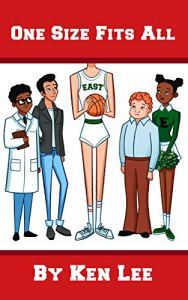
Quote from One Size Fits All—“Inside, we’re all the same size…and the same color.”
Quote from Joseph the Carpenter—“The path of the righteous is not always well lit, but it is always well planned.” Included in Voices from the Bible Vol. One
Where can readers follow you and your work?
Facebook:https://www.facebook.com/Ken-Lee-Books-100732788437029
Amazon: https://www.amazon.com/Ken-Lee/e/B08GBD5L2H/
Thank you, Ken, for spending time with us. Be sure to check out Ken’s inspiring works.
Interview with Author Georgia Rose
[image error](This article first appeared in 2019 and has been updated.)
In 2019, I won an audio copy of Georgia Rose’s Parallel Lies. I really had no idea what to expect, but set my phone to play and dove in. Within the first few pages, I’d become a fan of this author. She wove a complicated portrayal of a character who seems outwardly confident, but I could sense the damaged person just below the surface. I highly recommend Parallel Lies.[image error]
J: If you don’t write full-time, what kind of job do you have, or have you had in the past? Does it play any role in your stories?
G: I have my own business providing office administration and bookkeeping services to local businesses. That fills more than full time hours much of the time but the really great thing is that I get to do it from home, so it fits in with the writing well. Although that tends to happen into the night and over weekends.
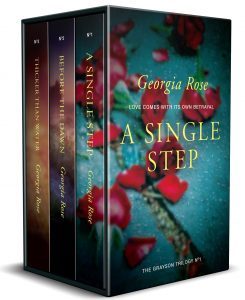 In the past I have done many things but the most important, for my writing, is that I have always been deeply involved with horses. I rode from a very young age then had my own or worked with other people’s horses as I grew up eventually qualifying as a riding instructor. Anyone who has read the Grayson Trilogy will know this and if you love horses too then please check them out. Many of my readers absolutely love the setting, I created it as my perfect place to live.
In the past I have done many things but the most important, for my writing, is that I have always been deeply involved with horses. I rode from a very young age then had my own or worked with other people’s horses as I grew up eventually qualifying as a riding instructor. Anyone who has read the Grayson Trilogy will know this and if you love horses too then please check them out. Many of my readers absolutely love the setting, I created it as my perfect place to live.
J: Horses are such amazing creatures. You’re fortunate to be able to spend time with them.
J: How long have you been writing seriously?
G: Since 2012. The Grayson Trilogy came to me pretty much fully formed over the course of one week’s holiday. I came back from that and wrote frantically until I got it all down.
J: I love it when that happens.
J: What genre(s) do you write? Why? Is there one you’d like to try?
G: I write the stories I want to tell rather than specifically to a genre so they are always a little cross-genre, however generally romantic suspense. Someone once described them as mysterious and romantic adventure stories, for adults. I like that. I prefer the dark side of romance, my characters have been through too much to be light-hearted.
J: How do you write? Typewriters, fountain pen, dictate, computer or longhand?
G: Definitely computer—I could never deal with all the rewriting to do it long hand.
J: Me too unless I get stuck. Then pen and paper switches how my brain works and I can break out.
J: What do you nosh on (snacks/drinks) while writing?
G: I am a grazer when it comes to food, and I have a sweet tooth, so having any snacks nearby is a recipe for disaster, as there is no such thing as saving any for another day. I’ll look away from my screen to find whatever it is gone, so I try not to avoid getting any out … but …
J: How do you prefer to interact with your fans/readers?
G: Fans!?! That still makes me laugh. No, seriously, any way they want to really but I generally get the most feedback and conversation via my newsletters. With my other commitments I find it very difficult to build up any meaningful interaction on social media although of course I can be found most places, and I get on there when I can.
J: How much of yourself do you put into your books?
G: I put my heart into my books—which is pretty corny but that’s the truth of it. When I’m writing I am very much going through what my characters are going through. This means I spent a lot of time sobbing while writing a particular scene of A Single Step, but anyone who’s read Parallel Lies will be pleased to know I didn’t start to behave as Maddy does … a step too far and all that!
J: And it shows in the depth of your characters.
J: What inspired Parallel Lies?
[image error]G: This simple, and short, scene:
It’s three the next morning, and I’m warm though my breath comes out as white clouds, frozen on the icy air. I hear it, behind me, and to the left. The snap of a twig underfoot and a sharp intake of breath at the indiscretion. He’s here, just as I knew he would be, but I allow myself a small smile of satisfaction knowing he’ll be cursing his mistake. I have no intention of making this easy for him so leave him to come and find me. I still, and although my heart is pounding, blood pumping in my ears until I’m sure he’ll be able to hear it too, I concentrate on making myself small and silent. I am one step ahead of him and plan on keeping it that way.
I had this in mind and the rest came from it.
J: Isn’t it amazing how one scene can launch an entire book? I well remember hearing that scene and having the hair on my neck stand up.
J: What was the hardest part of writing Parallel Lies?
G: Simply finding the time to get it done. I am what has been termed a tea-break writer and usually open my manuscript up in the morning then dash back to it as the day progresses to add a few words here and there. It’s a terribly disjointed way of doing things but that is the way things are at the moment.
J: I find I’m more of a big block writer. But that applies to a lot of my life. I prefer large swaths of time to go deep into a project.
J: What is the most special thing a reader has said about Parallel Lies?
G: I count myself as fortunate to have received many terrific reviews but I particularly like this line from Barb Taub: “For those who admire character-driven thrillers, who can handle brief but shocking violence, and who enjoy beautiful writing, I can’t recommend Parallel Lies enough.” It tells readers all they need to know in one perfect sentence.
J: She captured the essence well.
J: Favorite quote from Parallel Lies?
G: “Keep the lies you’re going to be telling parallel to the truth of the life you previously led.” Once I wrote that I knew I had my title.
J: I had that same thought when I read it.
J: What are you working on now?
G: I am nearing the completion of the sequel to Parallel Lies, a book that was meant to be a standalone. Anyway, I am meeting with my editor shortly to go through his dissection of it and it’s out with my beta-readers too. I’m hoping to get that out in the autumn of 2019. (The sequel, Loving Vengeance came out in Oct 2019.)[image error]
I’m also on the first draft of a novella, which will definitely be a standalone. And I’m outlining a series I have in mind. If the outlining goes well I shall progress that later this year.
Questions of interest to other authors
J: Do you read your book reviews? How do you deal with bad ones?
G: I always read my reviews because I appreciate the time and effort it takes for readers to write them and I cherish every one, yes, even those that are harder to read. I am fortunate not to have received that many bad ones, certainly none that have really ripped into a book, I think that would be hard to take, but you simply have to take the content of them on board and move on. We all know not every reader is going to enjoy your work.
J: I read mine also. It tickles me when someone takes time to leave a review, even if it’s just one line.
J: Do you hide secrets in your books that only a few people will find?
G: Oh yes … I love doing that, although it’s less about secrets and more about things only certain people will recognize.
Blurb for Parallel Lies:
A woman with a hidden past. A new love on the horizon. Will the truth set her free or cost her everything?
Madeleine Ross has meticulously organized her world to leave no trace of her criminal past. After creating a new identity for herself, her only remaining connection to her previous life is the security work she does for a small-town insurance company. But when she starts falling for her handsome boss, Dan, she’s worried letting him in will expose secrets best kept locked away…
As their attraction grows stronger, Madeline’s attempts to keep Dan in the dark go horribly wrong when a dangerous ex emerges from her unsavory past. After her former flame gives her an offer she can’t refuse, she has one choice left: ditch her life as a thief to let Dan in or embrace her shady dealings to destroy her only shot at a happy future.
Parallel Lies is the first book in a fast-paced romantic suspense series. If you like troubled heroines, character-driven action, and powerful emotions, then you’ll love Georgia Rose’s thrilling novel.
Buy Parallel Lies to unlock a secret identity today!
Bio:
Georgia Rose is a writer and the author of the romantic and suspenseful Grayson Trilogy books: A Single Step, Before the Dawn and Thicker than Water. Following completion of the trilogy she was asked for more and so wrote a short story, The Joker, which is based on a favorite character from the series and the eBook is available to download for free at the retailer site of your choice.
Her fourth novel, Parallel Lies, encompasses crime along with Georgia’s usual genre blending, and although it was meant to be a standalone its sequel was released later in 2019.
Georgia’s background in countryside living, riding, instructing and working with horses has provided the knowledge needed for some of her story lines. The others are a product of her passion for people watching and her overactive imagination.
Her busy life is set in a tranquil part of rural Cambridgeshire in the UK where she lives with her much neglected husband and dog. Their son, currently at university, comes and goes and their daughter, having delighted them all for long enough, has eventually moved out, married, and will be making Georgia a grandmother later this year.
Links to Georgia:
Newsletter (get A Single Step for free by signing up here, plus this is where you will hear about giveaways and any offers on my books)
Thank you, Georgia, for spending time with us. Be sure to check out Georgia’s current works.
March 21, 2021
Interview with Author Eldonna Edwards
[image error](This article was originally published in 2019 and has not been updated.)
During 2018, I won an autographed copy of This I Know by Eldonna Edwards. On a bright sunny day last summer, I lounged on my deck and dove into the words. Once I began, I could not stop. I was pulled in and entranced by Grace, who became one of my favorite characters of the year. In celebration of Eldonna’s new book coming out in a couple of weeks, Clover Blue, (see below for pre-order details) and because I loved This I Know so much, I invited Eldonna in for a chat.
J: Eldonna, what is something readers might want to know about you.
E: I often go by Ellie because it’s easier to write on a coffee cup. I’ve been in love with writing since I penned my first poem at the age of nine where I grew up in West Michigan, the fifth of seven children headed by a rural preacher. I currently teach memoir and fiction at our local writer’s conference. Fun fact: in 2010 I donated a kidney to a complete stranger. My story was featured in a documentary (Perfect Strangers) and I wrote a memoir about my experience (LOST IN TRANSPLANTATION). I had this idea that I wanted to change someone’s life. Turned out the life it changed the most was mine.
J: Wow. When you set out to change a life you don’t go half-way.
J: Tell the readers about This I Know.
[image error]E: THIS I KNOW a luminous coming-of-age story set in a small Midwest town in the late 1960s and helmed by an unforgettable young protagonist—compassionate, uncannily wise Grace. Eleven-year-old Grace Carter has a talent for hiding things. She’s had plenty of practice, burying thoughts and feelings that might anger her strict Evangelical pastor father, and concealing the deep intuition she carries inside. The Knowing, as Grace calls it, offers glimpses of people’s pasts and futures. It enables her to see into the depth of her mother’s sadness, and even allows Grace to talk to Isaac, her twin brother who died at birth. To her wise, loving Aunt Pearl, The Knowing is a family gift; to her daddy, it’s close to witchcraft. When her mother lapses into deep depression after bringing a new baby home, Grace will face a life-changing choice—ignore her gift and become the obedient daughter her father demands, or find the courage to make herself heard, even if it means standing apart.
J: I was intrigued by, and could relate to, the gift Grace had because I personally have experienced a bit of intuition. During my time practicing Energy Medicine, I trained myself to feel/intuit the emotions of my clients. I couldn’t imagine having a gift like that at such a young age.
J: If you don’t write full-time, what kind of job do you have, or have you had in the past? Does it play any role in your stories?
E: Although I no longer practice, as a massage therapist for over two decades, I came to understand that there’s a lot we don’t understand about the connection between our bodies/minds and the surrounding world. What I do know is that keeping an open mind to the unknowable is paramount to a broader experience of this life. I decided early on that I wanted to explore the “what ifs” of someone who maintains a deep intuition—what we sometimes call the gift of sight—and how those uncanny abilities might challenge the belief system of a conservative family and/or community. Thus, THIS I KNOW was born.
J: I love playing “what if” when I’m writing.
J: What genre(s) do you write in? Is there one you’d like to try?
E: I love coming-of-age stories for adults because it’s a way to remember those formative years between the freedom of innocence and the gradual recognition of the larger world around us. I’m a huge fan of Southern fiction but don’t feel like I have the born-cred to pull it off. However I do sometimes blend southern characters into my stories.
J: I also love Southern fiction and write a bit of it myself. Growing up in south Texas gives me born-cred, as you say, just a slightly different flavor of it.
J: Do you write to music/create play lists?
E: I prefer absolute quiet when I’m writing, other than the sounds of nature. I will admit to occasionally casting my characters in a film and choosing an imaginary soundtrack.
J: I’ve also found that I can’t write to music that has words. The words make me think of other stories and interfere, sending me off down the rabbit trail of something new.
J: What do you nosh on (snacks/drinks) while writing?
E: I rarely eat when I’m in the writing groove. Sometimes I’ll get so deeply into the zone that I’ll come out the other end ravenous because I missed a couple of meals.
J: I wish that were true of me (I say while stuffing Reese’s Pieces in my mouth).
J: What are you currently reading?
E: I’m reading THE GIRLS by Emma Cline. The story is a sort of re-telling of the Manson murders. I chose it because my next book features a young boy raised in a spiritual commune who doesn’t know who his parents are. It seemed like a good comp title for my book due to the time period and cult-ish themes and I’m really enjoying it. I’d love it if Emma would blurb my next book!
J: I haven’t read that one but you made me go take a look. It sounds fascinating.
J: How do you prefer to interact with your fans/readers?
E: I’m on Twitter and Instagram but I much prefer Facebook because I like the slower conversations that are more about connection and less about the latest greatest thing or snarky retorts. But my favorite way to interact with readers is to Skype into book club discussions!
J: Facebook is also my preferred way to interact. Doing a Skype with a book club sounds like fun!
J: What inspired THIS I KNOW?
E: We live in divisive times where people seem very attached to their opinions, including political and religious beliefs. In THIS I KNOW I’ve juxtaposed a dogmatic rural pastor against a daughter whose extraordinary abilities challenge his core belief system. Will love for his child overrule his seemingly-inflexible tenets? Are people capable of encompassing new ideas, especially as they pertain to one’s spiritual identity?
J: I truly felt for Grace having to hide this part of herself and am always a bit taken aback when I encounter people as inflexible as her father.
J: What was the hardest part of writing THIS I KNOW? The best part?
E: Hands down, writing the sexual assault was the hardest. I am fortunate not to have experienced this in my lifetime, but people very close to me have. I cried through the whole scene and it shook me to my core. I had to let the book sit for a while before I could come back to it. The scene I most enjoyed writing is when Grace’s sisters convince her to dress up as a fortune teller and charge the neighborhood kids to get their questions answered. What child doesn’t love turning a refrigerator box into a store, a space-ship or a fortune-teller booth? This scene allowed me delve into our insecurities that begin at an early age. Do my parents love me? Will I find my soul mate? Will I overcome these awkward years to enjoy a successful life?
J: And you handled all of these scenes so well. Your ability to capture emotions is a gift.
J: What are the most common misconceptions about THIS I KNOW?
E: 1. People assume that THIS I KNOW is an autobiography. Although steeped in my memorable upbringing as a preacher’s daughter, THIS I KNOW mostly comes from my overactive imagination. 2. Readers sometimes assume THIS I KNOW is a religious book or the opposite, an anti-religious book. It is neither. THIS I KNOW is about a young girl who hungers for approval, most especially from her father. It’s about loss, about sorrow, about forgiveness and the joy of finally embracing one’s uniqueness.
J: I can see how readers might make those assumptions given your upbringing and the fact that you’ve also written a memoir about your kidney donation experience.
J: What is the most special thing a reader has said about THIS I KNOW?
E: My very first netgalley review was from a librarian. It made me cry. She wrote, “Once in a while you read a book that just takes your breath away with its beauty and truth. This I Know is such a book. This is one of the most beautiful coming of age stories I’ve ever read, and it will stay with me for a long, long time.”
J: That’s exactly how it made me feel.
J: Favorite quote from THIS I KNOW?
E: The human struggle—especially for young girls—to fit in and to embrace one’s unique gifts is very real. Our identity as individuals is shaped by the support (or lack of support) from family and peers. In THIS I KNOW Reverend Carter emphatically refuses to accept his daughter’s clairvoyance and forbids Grace to explore her uncanny intuition. Her mother is emotionally absent due to debilitating depression. Grace’s community vacillates between fear and exploitation of Grace’s abilities. This leaves Grace to seek friendship and support from a homeless man, a bohemian family and, most especially, her deceased twin, with whom she carries on deep conversations throughout her life. Which brings me to my favorite quote: “It takes a lot of energy to try to be what you aren’t, but even more not to be what you are.” Grace Carter, age 13.
J: I remember reading that line and sitting back thinking how true and powerful it is.
J: What are you working on now?
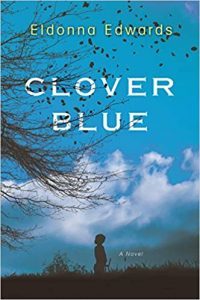 E: My next book, Clover Blue (May, 2019) is another coming-of-age story set under the redwoods of a northern California commune in the 1960’s/70’s. Like most spiritually-based collectives of the era, Saffron Freedom Community’s imagined utopia inevitably mirrors the dysfunctional society its members hoped to escape. Ultimately, CLOVER BLUE is a study in the differences between family and tribe and whether love is earned or deserved. Questions of interest to other authors.
E: My next book, Clover Blue (May, 2019) is another coming-of-age story set under the redwoods of a northern California commune in the 1960’s/70’s. Like most spiritually-based collectives of the era, Saffron Freedom Community’s imagined utopia inevitably mirrors the dysfunctional society its members hoped to escape. Ultimately, CLOVER BLUE is a study in the differences between family and tribe and whether love is earned or deserved. Questions of interest to other authors.
J: I read the description of Clover Blue and have already put it on my TBR list. Check out the trailer for it here.
J: Do you believe in writer’s block?
E: I don’t believe in writer’s block so much as writer’s burnout. I think sometimes we try too hard to push the river and expect the words to just flow. My cure is to stay put and write crap until I hit the mother lode, or walk away and come back when I’m refreshed and rested. Eventually something worth keeping will land on the page.
J: That’s kind of how I look at it also. Sometimes walking away is the best option.
J: Do you read your book reviews? How do you deal with bad ones?
E: I’ve heard you should never read your reviews but I can’t help myself. It’s a tic. I love learning how my book(s) spoke to different readers in different ways. I look at critical reviews through an objective lens. Quite often it’s just a matter of my book just not being a good fit for a particular reader. Once in a while, someone will write a nasty review that reeks of meanness. I try to imagine what it must be like to be that person, holding all that ugliness inside, and then I don’t feel so bad.
J: That is an awesome technique. I sometimes do that with people acting like jerks on the road or driving too slow. I try to invent a story to explain why they might be behaving that way.
J: Do you hide secrets in your books that only a few people will find?
E: I hid every one of my sibling’s names in THIS I KNOW. All but one of them (I’m looking at you, David) noticed!
J:How do you select names for your characters?
E: I love coming up with names! In THIS I KNOW Rev. Carter gives each of his children Bible names—Joy, Hope, Grace, and Chastity—but none of them fit. His wife names the last baby before he has a chance to screw it up again. In my next book, CLOVER BLUE, the members of the Saffron Freedom Community all change their names when they join. Goji is the leader, Wave is a former surfer, Coyote takes late night walks, Willow is a flexible yogi, Doobie is a pothead, etc. I had a lot of fun coming up with “hippie” names for my tribe.
J: Coming up with character names is fun. Mine often come to me already named, but in my current work in progress, The Things We Do Not Speak Of, the main character is a Somali refugee and her family. I searched for names that had particular meanings for each character to reflect how I thought of them.
J: You can learn more about Eldonna and her work at the following:
Facebook: facebook.com/eldonnaedwardsauthor Bookbub: https://www.bookbub.com/authors/eldonna-edwardsTwitter: twitter.com/eldonnaedwards Insta: www.instagram.com/eldonnaedwardsauthor Website: www.eldonnaedwards.com Goodreads: https://www.goodreads.com/author/show/7707972.Eldonna_Edwards Blog: https://eldonnaedwards.blogspot.com/J: Thank you, Eldonna, for spending time with us.
J: And last but not least, some glowing words about Eldonna and her work.
“In a pitch-perfect voice, Edwards captures Grace’s struggles to understand the pain of those around her as she deals with her own, especially her desire to be loved unconditionally by her father. Grace displays a wellspring of compassion—for the homeless man who sometimes squats in her family’s barn, for families who have lost loved ones and especially for her mama, whom she desperately wants back from the grips of depression. Like Grace, Edwards is the daughter of a preacher, and this write-what-you-know aspect lends This I Know a depth of feeling and honesty. Edwards’ conversational style and the first-person diaristic tone create an enveloping warmth that draws the reader in.” —Bookpage
“If you’re looking for good, old-fashioned storytelling, one that will pull you in from the beginning and never let go, this is the book for you.” —Historical Novels Society
“In this outstanding debut, Eldonna Edwards has created an enchanting, lovable narrator by the name of Grace Carter, who shares all she sees about her world and beyond. Rendered in a voice at once singular and exquisite and with an old soul sense of wisdom, I was captivated by this story of a girl and her unique gift, her love of family, the pain of loss, the sting of indifference, and the simple joy of acceptance, but most of all by Grace, and her purity of heart.” —Donna Everhart, author of The Education of Dixie Dupree
“A heartfelt and beautifully crafted coming-of-age debut about a gifted, eleven-year-old girl attempting to find her place in a confusing world. This I Know shines, due in large part to narrator Grace, one of the most authentic and charming young characters I’ve come across in a long time. Don’t miss this one.” —Lesley Kagen, New York Times bestselling author of The Mutual Admiration Society
“Simply magical writing. Eldonna Edwards is a true storyteller. She tossed me straight into her book and there I stayed until the last word on the last page.” —Cathy Lamb, author of No Place I’d Rather Be
“Eldonna Edwards has crafted a compelling allegorical tale about the fear of otherness in this coming-of-age tale. Readers of all ages will find an unlikely hero in 11-year-old Grace Marie Carter—who was born with a type of clairvoyance she calls the “Knowing”—as she bravely forges her own path in a world that is constantly trying to silence her voice.” —Amy Impellizzeri, author of The Truth About Thea
“A remarkable, inspiring story about clairvoyance, faith, and opening your heart—and mind—to the truth. I will not soon forget Grace Carter, the young preacher’s daughter with a unique interpretation of the world. Her kindness, her resilience, and her gloriously quirky voice have me shouting to readers everywhere, ‘I love this book!’” —Barbara Claypole White, bestselling author of The Perfect Son
Interview with Author Sarah Angleton
 (This article was originally published in 2018 and has been updated.)
(This article was originally published in 2018 and has been updated.)
One of my favorite reads last year was Launching Sheep & Other Stories, which is a collection of humorous essays about history from the perspective of everyday life. It was written by Sarah Angleton, one of amazingly talented writers in the writers guild we both call home—Saturday Writers. To say I laughed my way through reading each of the stories wouldn’t do them justice. They are funny and thought provoking (in a tickle-my funny-bone kind of way) and I think I might have even learned a few historical facts. Should I ever be called up as a contestant on Jeopardy I might be able to hold my own.
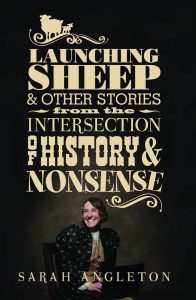
Since Sarah’s debut novel released last week, I decided that now would be a good time to introduce her to my readers.
[image error]Her new book, Gentleman of Misfortune, is historical fiction. I’m about a third of the way through it and have to keep making myself get up to take care of all those other things life demands. That means I’m loving it.
J: So Sarah, tell us a little about yourself.
S: I’m a writer, blogger, wife, mother, book nerd, and history enthusiast from St. Louis. I love rooting for the Cardinals but don’t care for the pizza.
J: Ha! I’m just the opposite—I love pizza, but don’t care much for baseball. Which isn’t a good thing when living in the home of the Cardinals.
J: I love books that bring me to tears. Is there a book that made you cry?
S: I recently read Like a River from its Course by Kelli Stuart, a World War II novel that focuses on the effects of German occupation in Ukraine. It’s a beautiful, gut-wrenching read. It’ll clear out your tear ducts for sure.
J: I’ve heard good things about that book, but haven’t read it yet.
J: What genre(s) do you write and why? Is there one you’d like to try?
S: I primarily write historical fiction because I really love the process of researching. I also sort of stumbled into writing humor as my blog developed. What started as a history blog morphed into part history, part humor, and part personal narrative. I also read broadly and have a soft spot for dystopian fiction. I have written the first in a dystopian trilogy that for the foreseeable future will likely only see the inside of a drawer in my writing office, but it captures my imagination, which for now is enough.
J: Ah ha … the ole book in the drawer. Well, I for one, hope it sees the light of day sometime.
J: Do you set a plot or prefer going wherever an idea takes you?
S: I tend to plot, with a loose, flexible outline that inevitably changes a lot as I work through the first several drafts. If I don’t have some idea of where I’m going, I find I can’t move forward enough to get anywhere.
J: I’m more of a pantser—I get an idea and jump, hoping there’s something to grab hold of.
J: Who are your favorite authors? Have they influenced your style?
S: This is always a tough question to answer because of course there are so many. But I love Anne Tyler for her wonderfully quirky, yet totally relatable characters. I love Graham Greene for his unapologetic use of allegory. No one puts together a sentence like John Updike or is as thorough in his research as James Michener. These are a few of the bigger names I admire. Right now I am fairly obsessed with the YA author Neal Shusterman, whose dystopian light horror is intriguing and chilling and brilliant, and I think the dark and luscious work of Dianne Stretfield is just amazing. I have never intentionally mimicked another author, but I do believe that everything I read influences how I write, and that the more I read, and the more widely I read, the better writer I become.
J: I totally agree with that—I also read widely and deeply in a variety of genres. Doing so improves my skills. Interesting you should mention Neal Shusterman. I had the delightful privilege of meeting him at a writing conference in 2017 where he was one of the keynote speakers. I purchased his novel, Challenger Deep, which is one of the best depictions of mental illness I’ve ever read. He wrote it after his own son was diagnosed with schizophrenia when he was only 16. The artwork in the book is his son’s.
J: How much of yourself do you put into your books?
S: My books certainly reflect my interests and my general personality and sense of humor. I think if they didn’t, I’d have a hard time communicating with my readers. But I have never knowingly based a character on myself or anyone I know, or based a plot upon any part of my real life.
J: I actually have in a couple of instances. In my debut novel, there’s a dog named Cooper, who I developed after a friend’s dog’s story. And there’s also an Italian gentleman who is loosely based on a friend. But he knew I was including him and was cool with it.
J: Do you have a favorite Indie author?
S: I admire the work of J.J. Zerr. His writing has a snappy sort of rhythm that’s really fun to read and he spins fascinating tales.
J: I’ll have to check him out.
So, tell the readers about your latest, Gentleman of Misfortune.
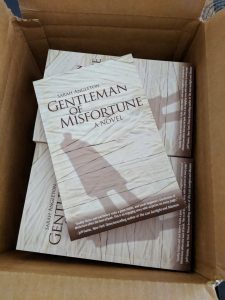 S: Gentleman of Misfortune is the story of nineteenth century gentleman swindler Lyman Moreau, who finds his next big scheme and loses his heart among a shipment of mummies bound for the most successful prophet in US history. I was delighted when Jeff Guinn agreed to review it.
S: Gentleman of Misfortune is the story of nineteenth century gentleman swindler Lyman Moreau, who finds his next big scheme and loses his heart among a shipment of mummies bound for the most successful prophet in US history. I was delighted when Jeff Guinn agreed to review it.
“Quality fiction and real history make a great match, and Sarah Angleton’s Gentleman of Misfortune offers the best of both. This is an engaging story with surprises on every page”. — Jeff Guinn, New York Times bestselling author of The Last Gunfight and Manson.
It came out October 2018 and is available for purchase at your local bookstore or online at:
Amazon, Barnes and Noble, and KOBO
J: What inspired Gentleman of Misfortune?
S: It’s historical fiction, so it follows a real story in which eleven mummies were shipped from the Valley of the Kings to New York. The shipment was claimed by a man who identified himself as the nephew and heir of the Egyptologist who discovered the mummies and died shortly after. The supposed nephew, Michael Chandler, displayed the mummies across several states, and eventually wound up in Ohio with four of them and a few pieces of papyrus covered in hieroglyphs. This remaining collection, he sold to Joseph Smith, founder and prophet of the Mormon Church.
The problem is that no one has been able to find a connection between Chandler and the Egyptologist or explain how he came to possess the mummies. When I came across this story, I had already written a related novel and in it, I had a minor character named Lyman Moreau, who was screaming that he had a larger story to tell. As I thought about it, it made a lot of sense to let him step in and assume Chandler’s identity and carry a novel as the leading man he seemed born to be. The other novel was unfortunately caught up in a conundrum with a small publishing house and so will be arriving on scene second instead of first, which I imagine makes Lyman pretty happy.
J: I’m sorry to hear about the snafu with the small publisher, but delighted that Gentleman of Misfortune has hit the shelves. I’d be reading it right now except that I need to get this done. J
J: What is your favorite quote from Gentleman of Misfortune?
“Elegant crime takes commitment and capital.”
J: What are you working on now?
S: I am currently knee deep in research for a historical novel that will explore the stories of missionaries to Liberia in the 1830s and 40s.
J: I love how you find such interesting topics to write about.
J: Do you hide secrets in your books that only a few people will find?
S: I don’t know that I hide secrets, but because I am writing historical fiction, I try very hard to do all my homework and place the little tidbits that will allow someone who really knows the specifics of the era or the historical details I’m using to understand and appreciate the work that has gone into creating the appropriate world for the story. Of course there’s always going to be that expert who catches the one mistake you make, but a little extra effort goes a long way to toward balancing out the inevitable errors.
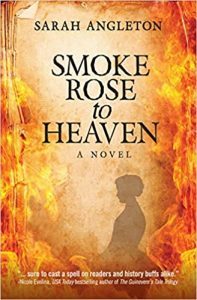 And Sarah’s latest book, Smoke Rose to Heaven, was released right before the pandemic got into full swing. Check it out.
And Sarah’s latest book, Smoke Rose to Heaven, was released right before the pandemic got into full swing. Check it out.
Check out the video trailer for Gentleman of Misfortune at: https://videopress.com/v/NylnfYo6
Where can readers follow you and your work?
My website at: https://sarah-angleton.com/
Goodreads: https://www.goodreads.com/author/show/13504508.Sarah_Angleton
Twitter: https://twitter.com/SarahAngleton
Facebook: https://www.facebook.com/sangletonwrites/
Instagram: https://www.instagram.com/angleton.s/

